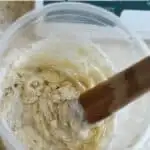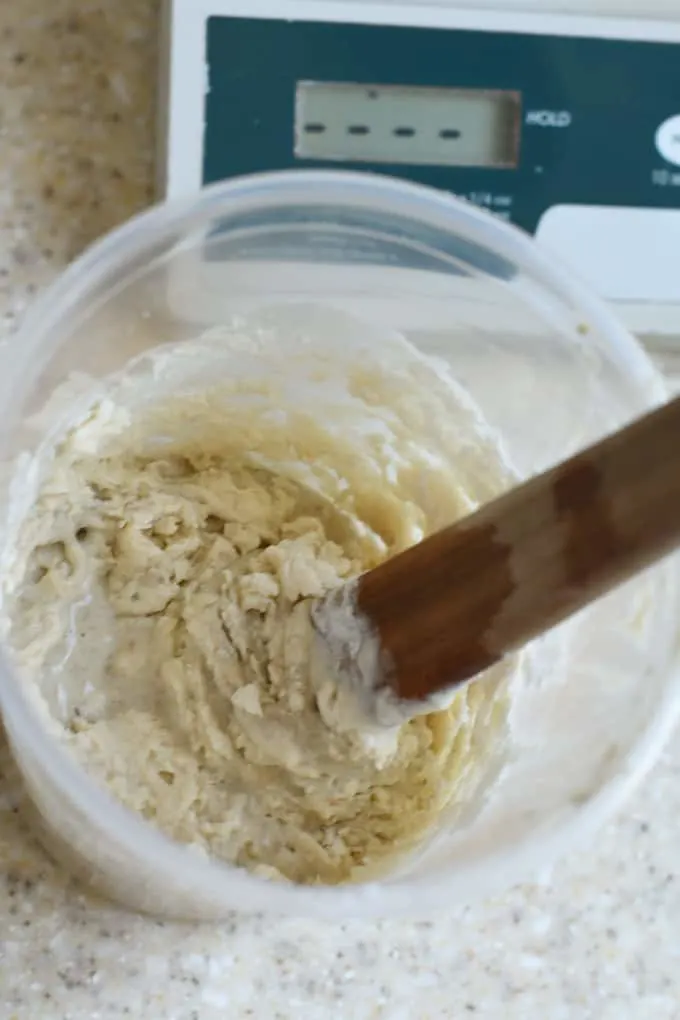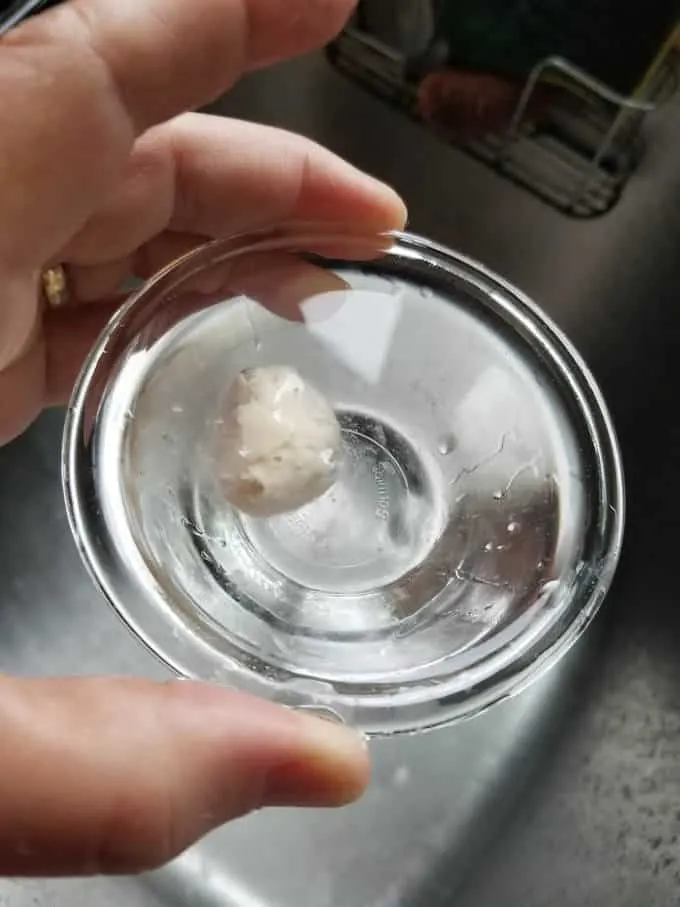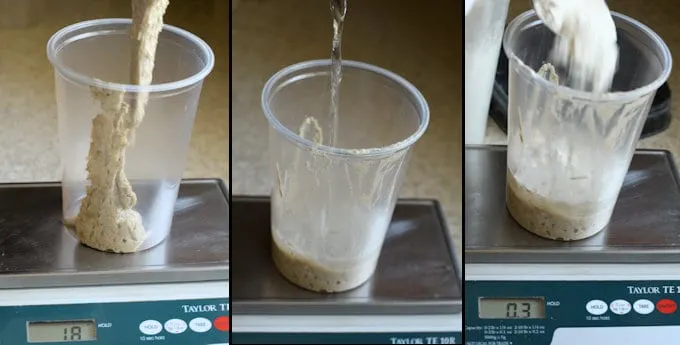How Often Should I Feed a Sourdough Starter for a More Sour Bread

Jump to How-To
You've done it! You've created a living batter filled with wild yeast. Now let's see how to feed & maintain your sourdough starter.
If you haven't made your starter yet, visit this post to see how to make a sourdough starter from scratch.

Right off the bat I'm going to say that there are a million ways to feed, maintain and use a sourdough starter. In fact, after you're done reading this post, you should read through my instructions for How to keep a small sourdough starter to see of that method would work better for you.
I am going to outline for you how I maintain my sourdough starters. I tend to have a fairly relaxed attitude towards the process. It works for me and I think my approach can work for you if you don't bake bread every single day (and even if you do).
At the end of the post you'll find a how-to card that lists the ingredient amounts and steps to follow each time you feed your starter.
But first I'm going to give you all the how's and why's and try to answer any questions you might have.
Tips for using and maintaining your sourdough starter:
- Since I don't bake every day, I keep my starters (yes, I have 3) in the refrigerator.
- If I'm making a 2-day recipe (most of mine are) I take the starter out of the refrigerator early in the morning of the day I'm making the dough. If the starter is inactive I feed it right away and it should be ready by early afternoon.
- If I'm making a 1-day recipe, I'll take the starter out the night before and feed it if it's inactive. It should be ready to use first thing in the morning.
- When the starter is cold from the refrigerator, I feed the starter using fairly warm water, warmer than body temp. The warm water will jump-start the cold starter.
- If the starter has been fed within the last 2-3 days, and has been refrigerated, you can probably go ahead and use it without feeding.
- If you're not sure if the starter is active, drop a dollop into a bowl of water to see if it floats. If it does, it's ready for baking.
- I write all my sourdough recipes to use 8 oz of active starter. After using 8 oz of starter in the recipe, I'm left with 4 oz of starter, exactly the right amount for feeding.

Schedule for feeding your sourdough starter:
- Your starter needs to be fed about 1x per week if refrigerated, and every day if left at room temperature.
- Generally, about 5-6 hours after feeding my starter is ready. The time may vary based on room temp, dough temp, etc. The starter should have doubled in volume and started to recede and/or pass the float test.
- I take my starter out of the refrigerator once a week for feeding, even if I'm not baking. Although, truth be told, I often go longer than a week between feedings and I haven't killed it yet.
- Did you know you can dry your sourdough starter? Dried starter can be kept indefinitely.
- After you've removed the portion of starter for baking, feed the starter again and leave it at room temperature for 3-4 hours before putting it back in the refrigerator.

FAQs about feeding & maintaining Sourdough Starter:
What if I forget to feed my starter for several weeks?
Honestly, I've gone longer than a month without feeding my starter and I haven't killed it yet. Give it a feeding and see if it wakes up. If it's alive, keep feeding it until it is reliably doubling in size within 4-5 hours.
Can I use a neglected starter as soon as it's been fed?
If you go more than about 2 weeks between feedings, you might want to give the starter 2-3 feedings before using. A starter that hasn't been fed for weeks will be quite sluggish and your dough won't be as lively.
Can I make dough with cold starter straight from the refrigerator?
If your starter was fed a day or two before, it's possible to use the starter straight from the refrigerator. Give it a float test to make sure it's active. The dough may take a little longer to ferment since the temperature of the dough will be colder.
What is that gray liquid on top of my starter, has it died?
It's called "hooch" and don't worry, your starter is still alive. Just stir that water back into the starter before feeding. Again, you might need 2 feedings to completely revive the starter since it's been quite dormant.
Do I have to weigh the ingredients?
To maintain your starter at 100% hydration it is best and most accurate to weigh your ingredients. If you're just a little bit off every time you feed, eventually, your starter could be thrown out of balance.
What if a recipe calls for less than 8 oz of starter?
No problem, use the amount of starter called for in the recipe. Then weigh out 4 oz of the remaining starter for feeding and discard the rest.
Do I have to discard starter?
If you continually feed the starter without discarding, you'll end up drowning in starter.
If I go on vacation, do I have to take the starter with me?
Unless you're going away for an extended time, your starter should be just fine for a couple of weeks in the refrigerator. If you'll be gone really long-term, put the starter into the freezer or dry it. Frozen or dried starter will need several feedings to rejuvenate.
Since you've got your starter fed, peruse the entire list of My Best Sourdough Recipes. Have fun!
If you appreciate this detailed information, I'd really appreciate a 5-star review.
Materials
- 4 oz (112g) unfed sourdough starter
- 4 oz (112g) all purpose flour
- 4 oz (120 ml) water, room temperature
Tools
- 1 quart glass or plastic container
- Wooden spoon or spatula
- Kitchen Scale
Instructions
- Weigh 4 oz of your unfed starter into a clean container. Discard the extra starter (see note)
- Add the flour and water and mix until combined. Set aside at room temperature.
- The starter is ready to use when it has doubled in volume and a small spoonful floats when dropped into a bowl of water. This generally takes 4-5 hours but the time can vary based on dough temperature and room temperature.
- If you do not plan to bake with the starter on the day it is fed, refrigerate 3-4 hours after feeding.
- Feed refrigerated starter weekly. If you go longer than a week without feeding, you may want to give the starter two feedings before using.
gillispieprign1979.blogspot.com
Source: https://www.baking-sense.com/2020/02/04/how-to-feed-maintain-your-sourdough-starter/
0 Response to "How Often Should I Feed a Sourdough Starter for a More Sour Bread"
Enregistrer un commentaire